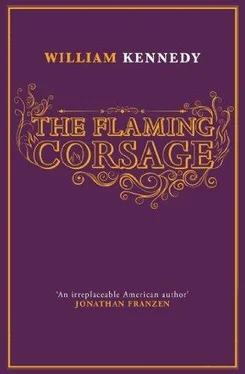CLARISSA: You have such lofty airs.
MARINA: And you are from womanhood’s lowest register. You linked yourself to my husband when he was a rising star, and now, after you’ve risen on his back, you want to destroy what remains of his life as a fallen star.
CLARISSA: I loved him truly.
MARINA: You began as a frivolous soubrette, full of intrigue, and in short order you’ve risen to become a sublime slut. Do your sluttish things, as you must, but don’t speak to me of love.
(Marina picks up teapot.)
Love is vertical. You are relentlessly horizontal.
(She proffers teapot.)
More tea?
Katrina Ruminates on what She has Seen
HE MAKES ME cleverer than I am. He knows things I do not know about Maginn. I don’t know how he knew Maginn came to see me, and I doubt very much Maginn had Felicity in a Pullman. She wouldn’t. Would she? Edward believes he knows the truth about my life without him. “I know of your dalliances,” he once said. “Of course you don’t,” I told him. He will come to know some of what was. His writing is acute, and bright people will admire it, but the clergy will try to have the play closed. No one can say such things publicly. Edward knows this. He is flaunting his play “You made me the villainous eater of broken meats,” he is saying. “Here then, see what raw fish such a man offers you.”
He is obviously finished with that woman. I do like the well-poisoner line. I wish I had said it. He is giving a shape to the chaos that overtook us. What he said at dinner — when the matter is ready the form will come. I wonder did he see me sitting in the theater? He did not come down. Perhaps he thought I would go backstage. No. He would assume I would not wish to confront them all. He must not have seen me. Nonsense, if he thought I could not face up to people. I’ve recovered. I’ve recovered from everything. It’s depressing how total my recovery is; as if the condition had not been serious. No one can know what the wound was like. No one would care to know. Even Edward could see only the blood, the scab, the scar. There will be a photograph of my recovery. It’s depressing how easily we reconcile the unthinkable. I must let Edward know why I never told him about Giles, and Maginn’s doggerel. How to tell him? I want no argument. Tell him also what no one ever knew about Felicity. But I saw it. Tell Edward these things now. Yes. Answer all questions. What was I supposed to do with my life? Was it correct, what I did? Was it worth doing? Write him a letter. A letter, of course. When the matter is ready the form will come.
She left the theater and walked to the cabstand in front of the Armory, full of the memory of significant life on the Hall’s grand stage. There she had seen Caruso and Pavlova and met John McCormack after he’d thrilled her with that old ballad (“Oh! hast thou forgotten how soon we must sever? Oh! hast thou forgotten this day we must part?”). She had watched Duse and Maude Adams and Richard Mansfield and countless others play out their charades of life, she had danced with Edward on the false floor that covered the theater seats for Governor Roosevelt’s inaugural ball. And this week Edward’s people, you among them, Katrina, will come to life on that enormous stage. And everyone’s legend will grow.
Katrina’s hat was so large that she had to tip her head sideways in order to step into the cab.
She entered her empty house, the servants gone until dinner, and left her bag and her hat in the drawing room. She made tea for herself in the kitchen and carried it on a tray to Edward’s office, where she set it atop his desk. She sat in Edward’s chair and took one of his lined tablets from the drawer. She sipped the tea as she considered the questions she would write answers to on the tablet.
“What, really, was my destiny?” she wrote.
She put her head down on the desk in acquiescence to the drowsiness the question evoked in her. She slept for she knew not how long, and awoke smelling smoke. She went to the window of the office and parted the curtains to see the Christian Brothers school next door in flames. It was clear to her that the fire would make the leap to this room in a matter of minutes. She went back to Edward’s chair and put her head down on his desk. The smoke was familiar in her mouth. She had breathed fire before.
Edward and Katrina Revisit the Cemetery, May 10, 1912
AFTER THE HOUSE burned, and Katrina died in his arms, Edward moved what was left of his life into a parlor suite at the Kenmore Hotel and began the process of gently evicting the Cohallon family from Emmett and Hanorah’s Main Street house: his house now, his only house now. He put Katrina in the hands of Ebel Campion, whose undertaking parlors were only two blocks from where she died, with instructions that there would be no wake, only a funeral mass in Sacred Heart church, and then private burial. He would not abide strangers ogling her corpse.
The buzzards were already at work on the leftover carrion from the Love Nest scandal, writing how the debauchery of the ogre Daugherty had shamed Katrina, hastened her death; and cheering — were they not? — for the innocent Melissa, who had replied to the evil done her by gaining much-deserved movie stardom. There they perched, at the edge of Edward’s life, anticipating new morsels from The Flaming Corsage , which would open May 11, the fourth day after Katrina’s death; for the show must go on now, Mr. Ogre, or not at all.
Sacred Heart church was filled, even to standing room, and hundreds more jammed the church steps, and Walter Street’s sidewalk, twenty minutes before the small cortege arrived. Six bearers carried Katrina’s coffin up the steps into the church, photographers recording her ascent, then moving their tripods to focus on Edward, impeccably tailored in black suit with cutaway coat and beaver hat, stepping down from the first carriage, with Martin next, dressed like his father, and then the heavily veiled Geraldine, triadic study in family distance. Geraldine’s brother, Ariel, and Archie Van Slyke came in the second carriage, then other relatives, friends.
As they entered the church in procession, Edward saw, first, the blaze of color on the altar: the dozen baskets of yellow flowers he had sent to brighten the solemnity for Katrina, then saw, with sharper focus, faces from North Albany, Colonie Street, Elk Street: Francis and Annie Phelan, and old Iron Joe with them; and Jack and Ruthie McCall, she refusing to measure his eye; and the Phelans: Peter, Chick, Molly, and Tommy, all in one pew; and Bishop Sloane, flanked by a brace of Minor Canons, bowing ecclesiastically to Geraldine as she passed him; and so many, many more neighbors and forever-nameless witnesses to the lamentable truth: that Katrina Selene Taylor Daugherty is no more.
Father Loonan, without the stamina to say mass, sat in trembling witness on the altar, as Edward had asked of him: Katrina’s counselor in the faith when she converted. Three other priests would celebrate Katrina’s passing with a solemn high mass, and Father Loonan, at the proper moment, feeble but clear of speech, and wearing his simple cassock and surplice, would stand and read the Gospel, not only from the mass for the dead, but also from the mass for the previous day on the liturgical calendar, as if the two Gospels were one; and Edward found the addition of the latter Gospel more than accidental redundancy: “. . You are the salt of the earth; but if the salt lose its savor, wherewith shall it be salted? It is good for nothing any more, but to be cast out, and to be trodden on by men. You are the light of the world. A city seated on a mountain cannot be hid. Neither do men light a candle and put it under a bushel, but upon a candle-stick, that it may shine to all that are in the house. .”
Читать дальше












